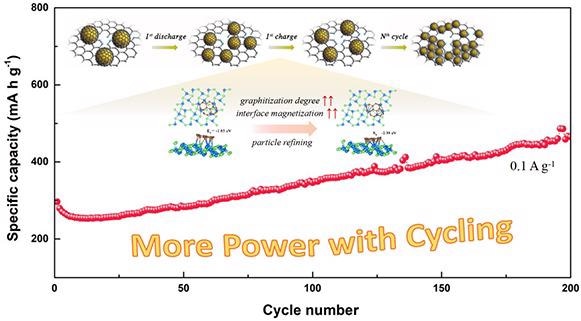The abundant availability of sodium and its low cost has turned people's attention towards sodium-ion batteries (SIBs). Electrodes with a higher capacity to store Na+ and cycling stability are key to enhancing the energy density and rate capability of SIBs.
 Schematic diagram of the mechanism of particle refinement to increase the cycle capacity of SIBs. Image Credit: Canpei Wang.
Schematic diagram of the mechanism of particle refinement to increase the cycle capacity of SIBs. Image Credit: Canpei Wang.
Two research groups from the Dalian Institute of Chemical Physics (DICP) of the Chinese Academy of Sciences, one led by Prof. Xianfeng Li and the other by Associate Professor Qiong Zheng, in association with another team from the Yanshan University, led by Prof. Tang Yongfu, have proposed a new mechanism of sodium/lithium-ion batteries electrode energy storage.
The study was published in the journal Angewandte Chemie International Edition on September 14th, 2021.
A coral-like FeP composite was developed by the researchers by anchoring FeP nanoparticles and dispersing them on a nitrogen-doped three-dimensional carbon framework, or FeP@NC. The coral-like FeP@NC composite exhibited a shorter charge transfer channel and a high conductive N-doped carbon network, thereby enhancing its charge transfer kinetics.
The SIB with FeP@NC composite delivers an ultra-stable cycling performance at 10 A g−1 with a capacity retention of 82.0 % in 10,000 cycles. This was due to the presence of a highly continuous N-doped carbon framework and a spring buffering graphitized carbon layer around the FeP nanoparticles.
Most significantly, the researchers integrated the electrochemical study and in-situ electron microscopy characterization to affirm an exclusive particle refinement mechanism to induce more potential during cycling. The effect of capacity improvement was more significant under small currents.
The researchers discovered that the FeP nanoparticles underwent a refining-recombination process during the first cycle and demonstrated global refining trends after dozens of cycles. This led to a consistent improvement in graphitization degree and interface magnetization, and also offered additional active sites for Na+ storage while increasing the potential with cycling.
The phenomenon of a gradual increase in the capacity can also be extended to lithium-ion batteries (LIBs). It is capable of maintaining capacity retention of 90.3% for LIBs after 5000 cycles at 10 A g−1.
The research was supported by the National Natural Science Foundation of China and the Youth Innovation Promotion Association of CAS.
Journal Reference:
Wang, C., et al. (2021) A Coral-Like FeP@NC Anode with Increasing Cycle Capacity for Sodium-Ion and Lithium-Ion Batteries Induced by Particle-Refinement. Angewandte Chemie International Edition. doi.org/10.1002/anie.202110177.